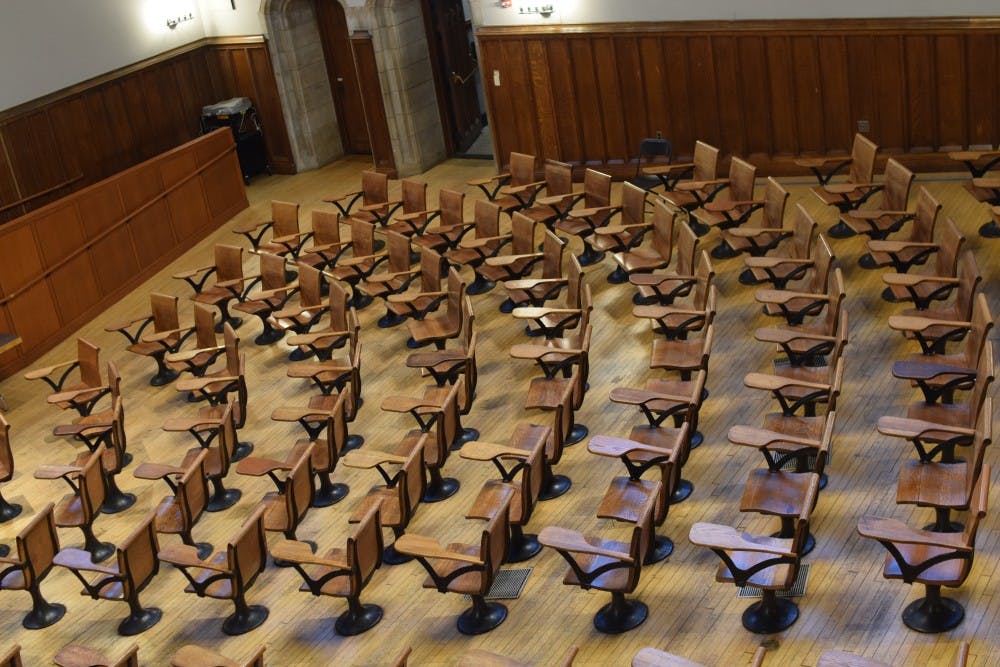Don’t let the fear of failure dictate your course selections.
Spring course selection is upon us. As we plan out our second semester schedules, I’ve noticed a prevalent phenomenon: Students value the difficulty (or lack thereof) of a potential class more than their actual interest in the class.
This allows the fear of failure to dictate their academic experience.
I know friends who choose easy courses, knowing full well that these classes will be intellectually uninspiring, avoiding more difficult ones for fear of receiving low marks or immoderate amounts of work. I know classmates who elect to drop into lower-level math classes because of one poor exam grade.
Almost unconsciously, students develop a fear of failure. We prioritize a class’s “easiness” over its pedagogical worth, limiting our own capabilities. I know people who forget the inquisitiveness they initially brought to college. The fear of failure is the exact antithesis of collegiate spirit. College is the perfect place to fail, as it is perhaps the last time we are able to try new things without consequence.
“Fail” doesn’t have to mean a literal failing grade. Instead, “fail” means performing worse than your own expectations; failure is inherently idiosyncratic.
Academic exploration’s main benefit is that you could discover something you truly love. An estimated 75 percent of students end up choosing a major different from what they intended upon entering college. That means that — especially for freshmen — you may not have found your passion yet. Additionally (for all the non-freshmen), even after declaring a major, approximately one third of undergraduate students changed their choice again before graduating.
Moreover, even if you are unequivocally certain of your major, you may still discover secondary passions in the form of certificates. Certificate requirements sometimes overlap with each other, so you may have already taken some of the necessary courses. In either case, the merits of exploration are abundantly clear.

You never know; a class you take out of genuine curiosity may be your true passion. The reward of finding something you are passionate about is far greater than the risk of losing a few GPA points.
Nonetheless, despite my patronage of academic exploration, I recognize there are some practical issues. Some students may contend that college is in fact not the “perfect place to fail,” especially when it comes to specific programs that demand a high GPA. Students on the premedical track, for example, often cannot afford to entertain uncertainties concerning their grades. This is a failure of the status quo.
Unfortunately, sometimes the college environment itself facilitates a fear of failure, uncharacteristically discouraging ingenuity. For students pursuing intrinsically GPA-stringent programs, the line between exploration and stability is harder to balance. There is no easy solution. In many regards, it is a systemic failure that those programs demand rigid GPAs.
Regardless, the idea of failure-averse decision making is a well-documented phenomenon. Behavioral psychologists have studied the rationale behind risk avoidance for decades. Former UC Berkeley professor Martin Covington proposed the PAW model. Our Performance in a task is linked to our Ability, which in turn reflects our self-Worth.

Thus, Covington argued that we subconsciously choose tasks we are confident we can complete, in order to protect our fragile egos. However, the price of self-esteem protection is steep. It results in less efficient learning.
We learn fastest when we fail, and we fail most when we are challenged. Consequently, we learn fastest while being challenged. This concept sounds (and is) conspicuously transparent, but our actions frequently do not reflect it.
Everyone has a unique threshold by which they define failure, but often we set the bar too low. We underestimate our own abilities, and thus we scare ourselves away from testing our true potential. Even as a freshman, I already find myself succumbing to these types of thoughts:
“What is the easiest SA class I can take?”
“Which writing seminar has the least amount of writing?”
As with most things in life, the trick is to find some semblance of balance. That balance manifests itself differently for different people. Typically, however, we err on the side of caution — most people are risk-averse, as University psychologist Daniel Kahneman found in his research.
In finding a happy medium, it is enough to be cognizant of people’s natural “play-it-safe” mentality. Simply by being aware of this bias, you can (and should) prioritize your intellectual discovery more than you fear the possibility of failure.
Ethan Li is a first-year from Stony Brook, N.Y. He can be reached at ethanl@princeton.edu.








